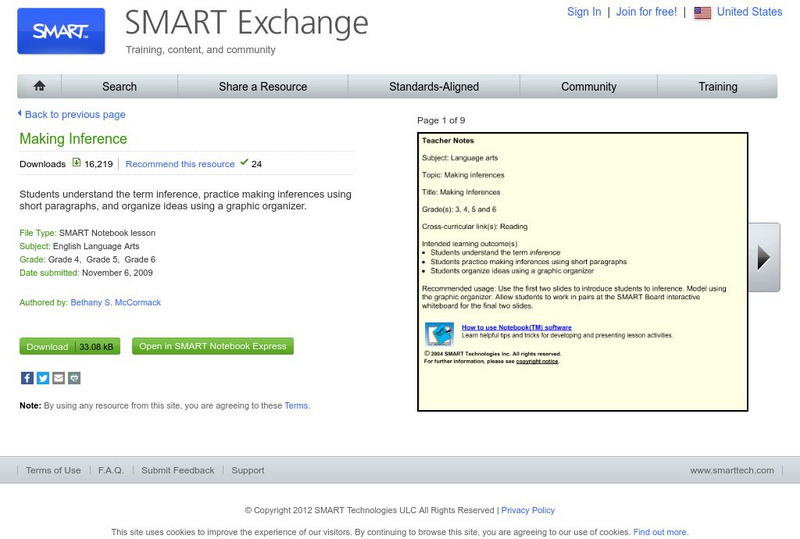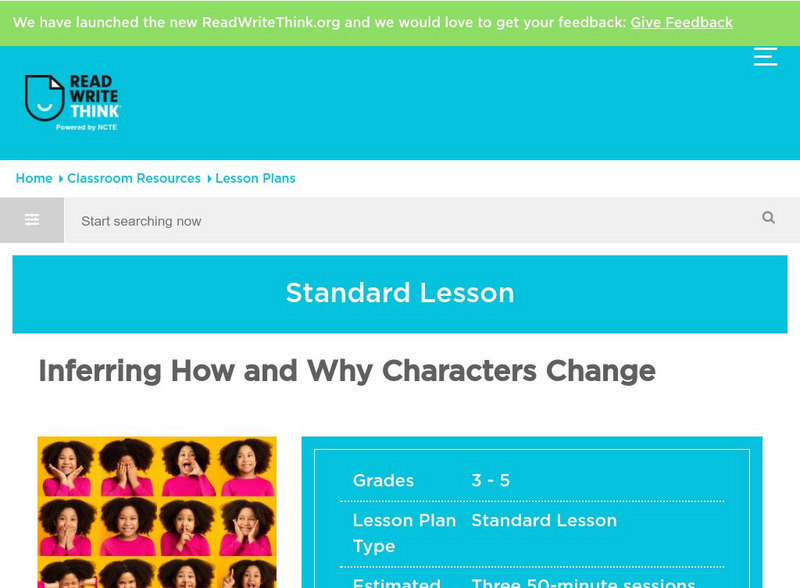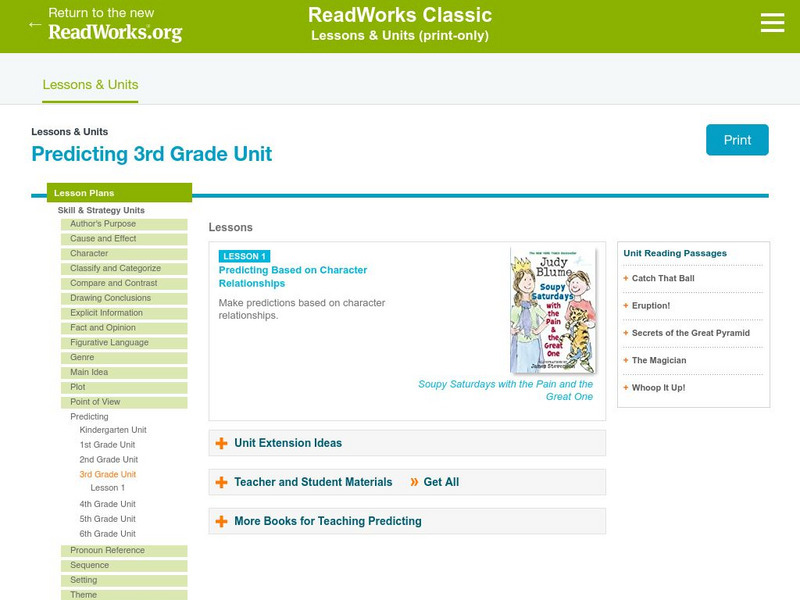Other
Pennsylvania Doe: Lesson Plan: Making Inferences and Drawing Conclusions
In this lesson the teacher uses modeling and questioning strategies to walk young scholars through making inferences in various texts and then using those inferences to draw conclusions.
Florida Center for Reading Research
Florida Center for Reading Research: Text Analysis: Incredible Inferences [Pdf]
A lesson plan in which students play a game to cover words on a game board by making inferences. Materials are included.
Florida Center for Reading Research
Florida Center for Reading Research: Text Analysis: Inference Innovations [Pdf]
A lesson plan in which students read a text and use a graphic organizer to make inferences. Materials are included.
Florida Center for Reading Research
Florida Center for Reading Research: Text Analysis: Incredible Inferences [Pdf]
A lesson plan in which students play a game by covering places on a board while making inferences. Materials are included.
TES Global
Blendspace: Be a Reading Detective! (Inferencing)
A six-part learning module with images and websites that students can use to build inferencing skills.
TES Global
Blendspace: Inference Lessons
An eleven-part learning module with links to images, videos, and websites designed to build inferencing skills.
TES Global
Blendspace: Inference
A fifteen-part learning module with links to images, videos, websites, and texts to use while learning to make inferences.
Huntington Library
Huntington Library: Learning From Leaves: From Observation to Inference [Pdf]
A lesson plan in which students explore plants from three different ecosystems and make inferences about plant structures and their environments. Includes discussion questions, a vocabulary glossary, and handouts.
SMART Technologies
Smart: Making Inference
Students will understand the term "inference," practice making inferences using short paragraphs, and organize ideas using a graphic organizer in this SMART whiteboard activity.
SMART Technologies
Smart: Inference and Prediction
Students will learn the difference between making a prediction and an inference as they engage in class discussions about both reading skills, play a game, look at art, and listen to songs.
Quia
Quia: Inference Battleship
Choose from three levels of difficulty and play a game of battleship against the computer. When hitting the opponent's ship, the player must first answer a multiple choice inference question.
Curated OER
Mc Graw Hill: Part 2 Reading: Informational Text: Quote Accurately
Learn about quoting accurately and making inferences on this site. A link provides a model with text and supported inferences.
Curated OER
Mc Graw Hill: 4th Grade Use Details and Examples
This reference from the McGraw-Hill CCCS Literacy eHandbook discusses the importance of recalling explicit details. The importance of inferencing skills with a how-to graphic organizer for making inferences are included. Students may...
E Reading Worksheets
E Reading Worksheets: Implicit Character Traits Worksheet
In this learning module, students will practice making inferences about character traits. A worksheet is provided to practice with finding implicit character traits. This module is designed to support Tier I, Tier II, and Tier III students.
Austin Independent School District
Austin Independent School District: Making Inferences [Pdf]
A graphic organizer designed to help students connect information from the text with personal experience to make an inference.
Other
The Critical Thinking Consortium: A Teacher's Guide to the Gardener [Pdf]
The Gardener by Sarah Stewart won the Caldecott Honor in 1998. It centres around a set of letters about a young girl who moved from the countryside to the city. In the lessons in this teaching guide, students must make inferences from...
ReadWriteThink
Read Write Think: How and Why Characters Change
This lesson plan examines and makes inferences into the change and development in characters. Included in the lesson plan is an overview, practice, objectives, resources, preparation, and more.
Curated OER
Mc Graw Hill: 4th Grade Use Details and Examples
When reading a story learn how to recall specific examples from the text to answer comprehension questions. In addition, you can also use story details to make inferences.
Polk Brothers Foundation Center for Urban Education at DePaul University
De Paul University: Center for Urban Education: I Can Identify and Infer Character Traits[pdf]
A poster offers guiding questions to help students with identifying character traits. Guiding questions are also provided to help them support their inferences about the character traits.
Quizlet
Quizlet: Main Idea, Main Idea Match
Terms related to main idea are included in this review "Match" game. Questions are provided for the following words: central idea, main idea, conclusion, infer, inferences, interesting detail, subject, summarizing, and supporting detail....
E Reading Worksheets
E Reading Worksheets: Making Predictions Worksheets and Lessons
In this learning module, students will learn more about making predictions in reading. Worksheets and a leson are provided to support Tier I, Tier II, and Tier III students.
Read Works
Read Works: Drawing Conclusions 3rd Grade Unit
[Free Registration/Login Required] A two-lesson unit on drawing conclusions through which students learn how to recognize the difference between implicit information and drawing conclusions. Students also learn to draw conclusions in...
Read Works
Read Works: Predicting 3rd Grade Unit
[Free Registration/Login Required] This is a instructional activity designed to teach students to make predictions based on relationships between characters. The instructional activity is based on the book Soupy Saturdays with the Pain...
Read Works
Read Works: Fourth Grade: One Lesson Unit: Drawing Conclusions
[Free Registration/Login Required] Students are guided through a lesson to understand the difference between explicit information and conclusions drawn from a text. With free login, users have access to passages used in this lesson.

![Florida Center for Reading Research: Text Analysis: Incredible Inferences [Pdf] Lesson Plan Florida Center for Reading Research: Text Analysis: Incredible Inferences [Pdf] Lesson Plan](https://content.lessonplanet.com/knovation/original/509092-1f8464bfd22060486a7ced8fa8c4310e.jpg?1661786985)
![Florida Center for Reading Research: Text Analysis: Inference Innovations [Pdf] Lesson Plan Florida Center for Reading Research: Text Analysis: Inference Innovations [Pdf] Lesson Plan](https://content.lessonplanet.com/knovation/original/509090-40e85c5bfbfa31dce3d470a549282f99.jpg?1661786988)
![Florida Center for Reading Research: Text Analysis: Incredible Inferences [Pdf] Lesson Plan Florida Center for Reading Research: Text Analysis: Incredible Inferences [Pdf] Lesson Plan](https://content.lessonplanet.com/knovation/original/509101-bb8c554899d4d9c53e422b2a416a2b4c.jpg?1661786972)
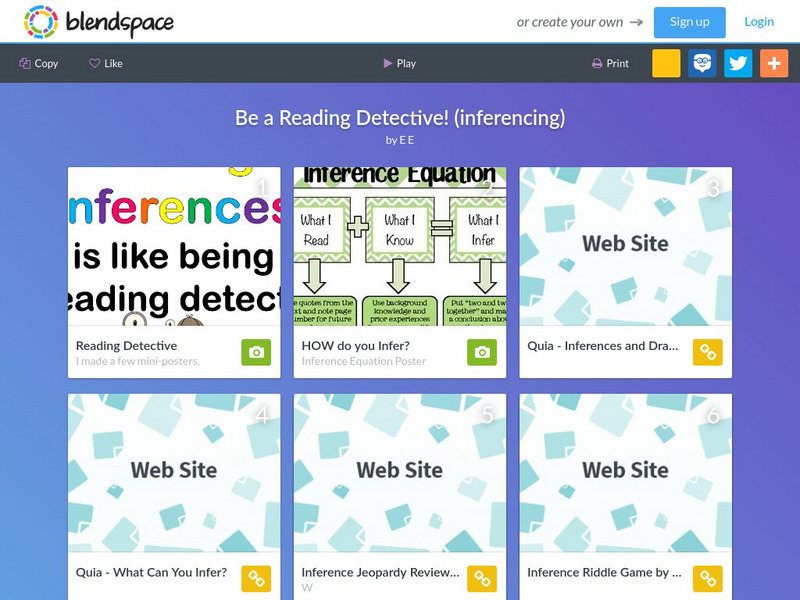

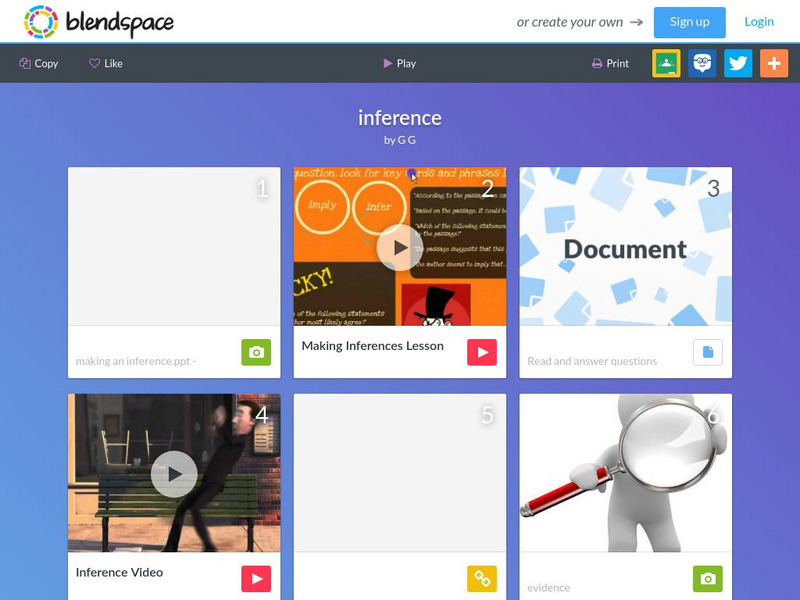
![Huntington Library: Learning From Leaves: From Observation to Inference [Pdf] Lesson Plan Huntington Library: Learning From Leaves: From Observation to Inference [Pdf] Lesson Plan](https://d15y2dacu3jp90.cloudfront.net/images/attachment_defaults/resource/large/FPO-knovation.png)
